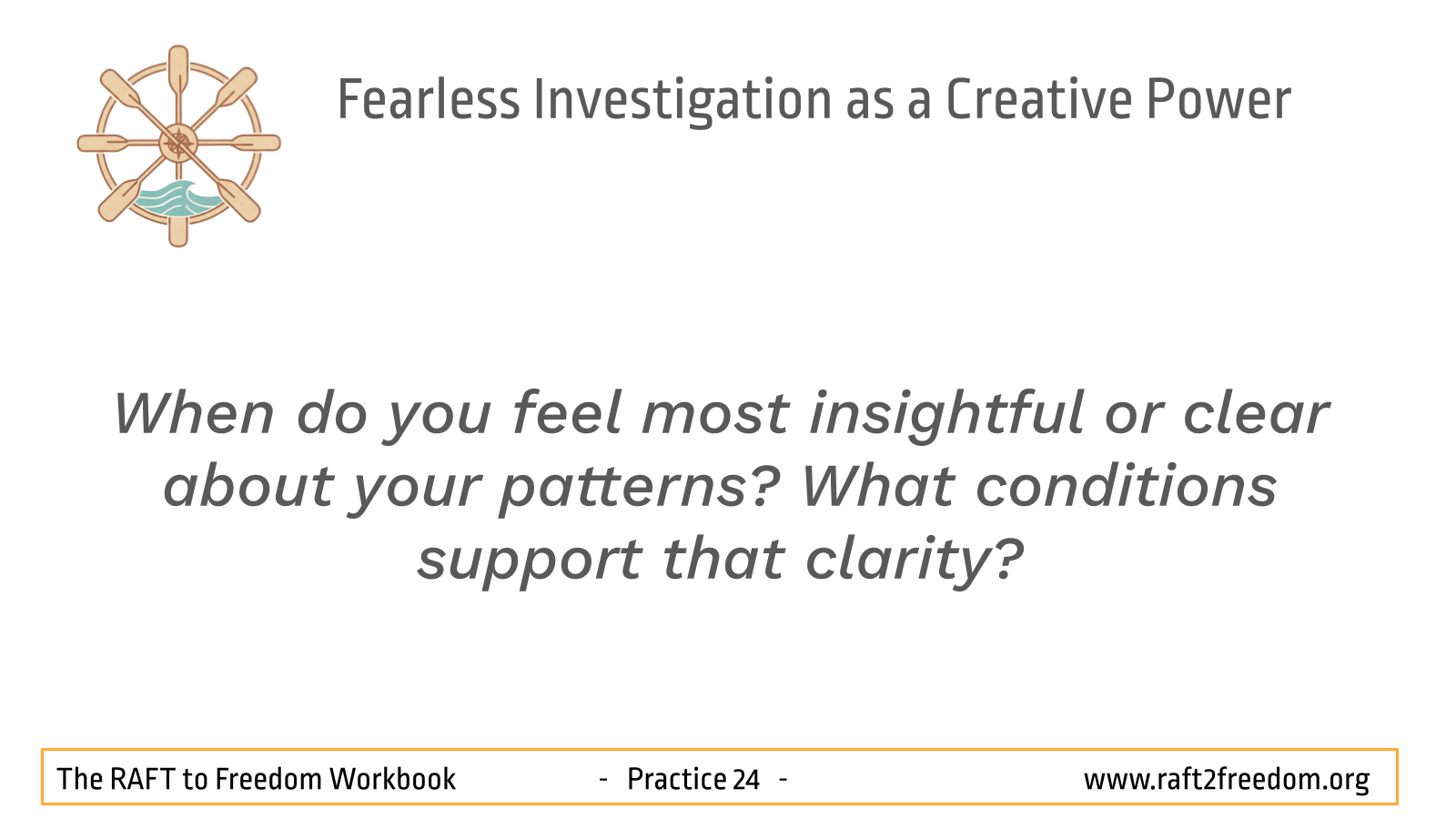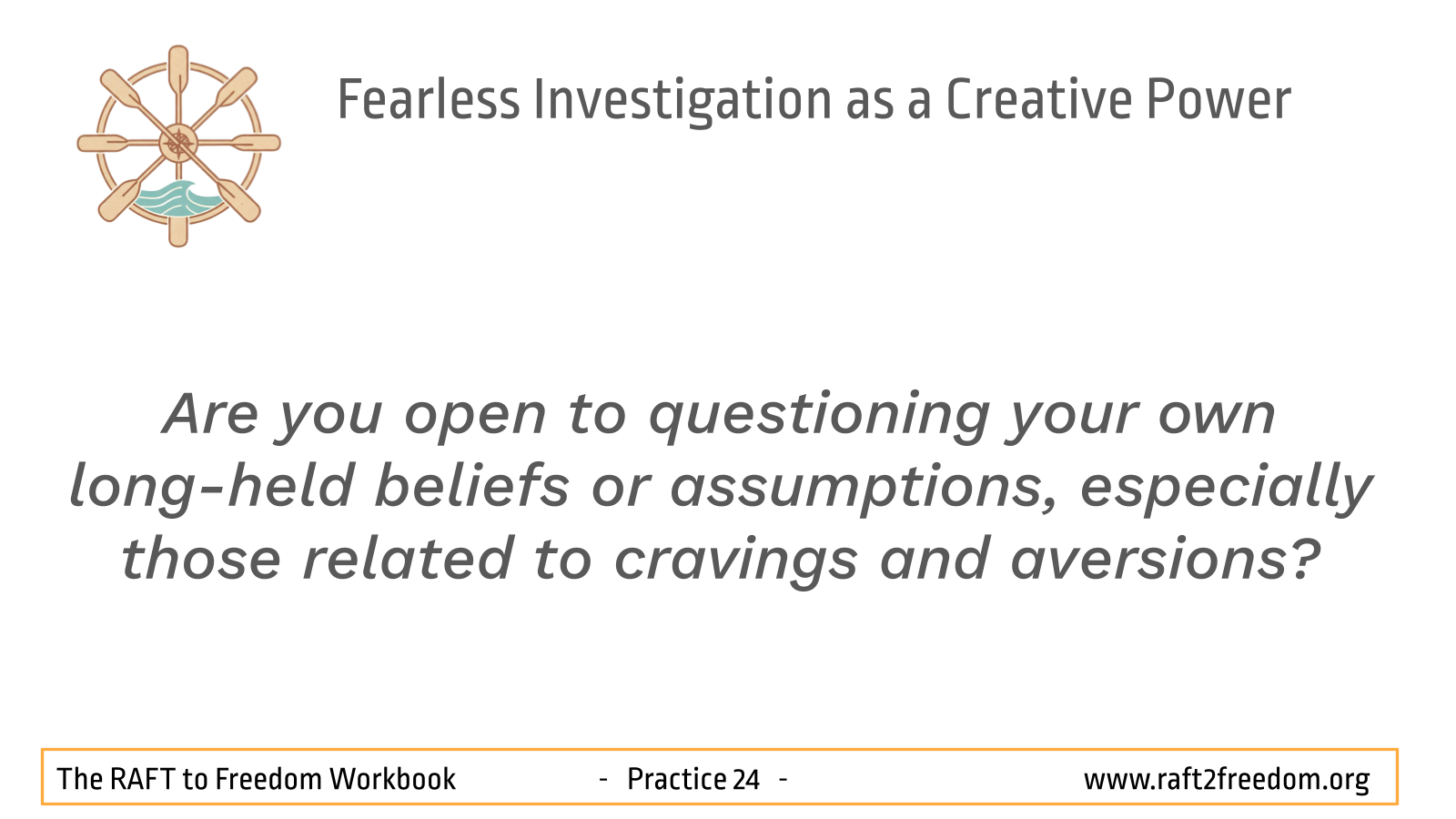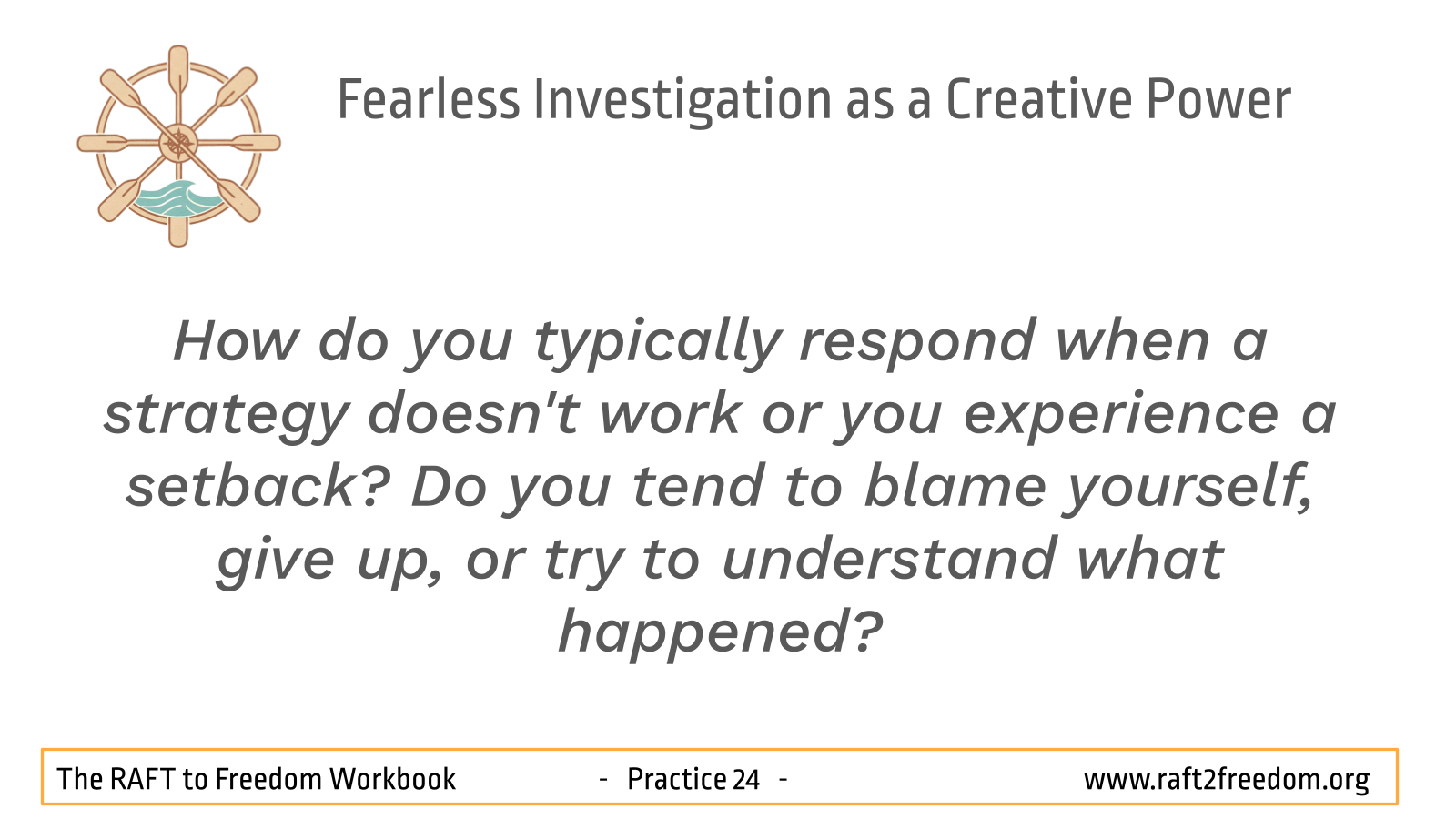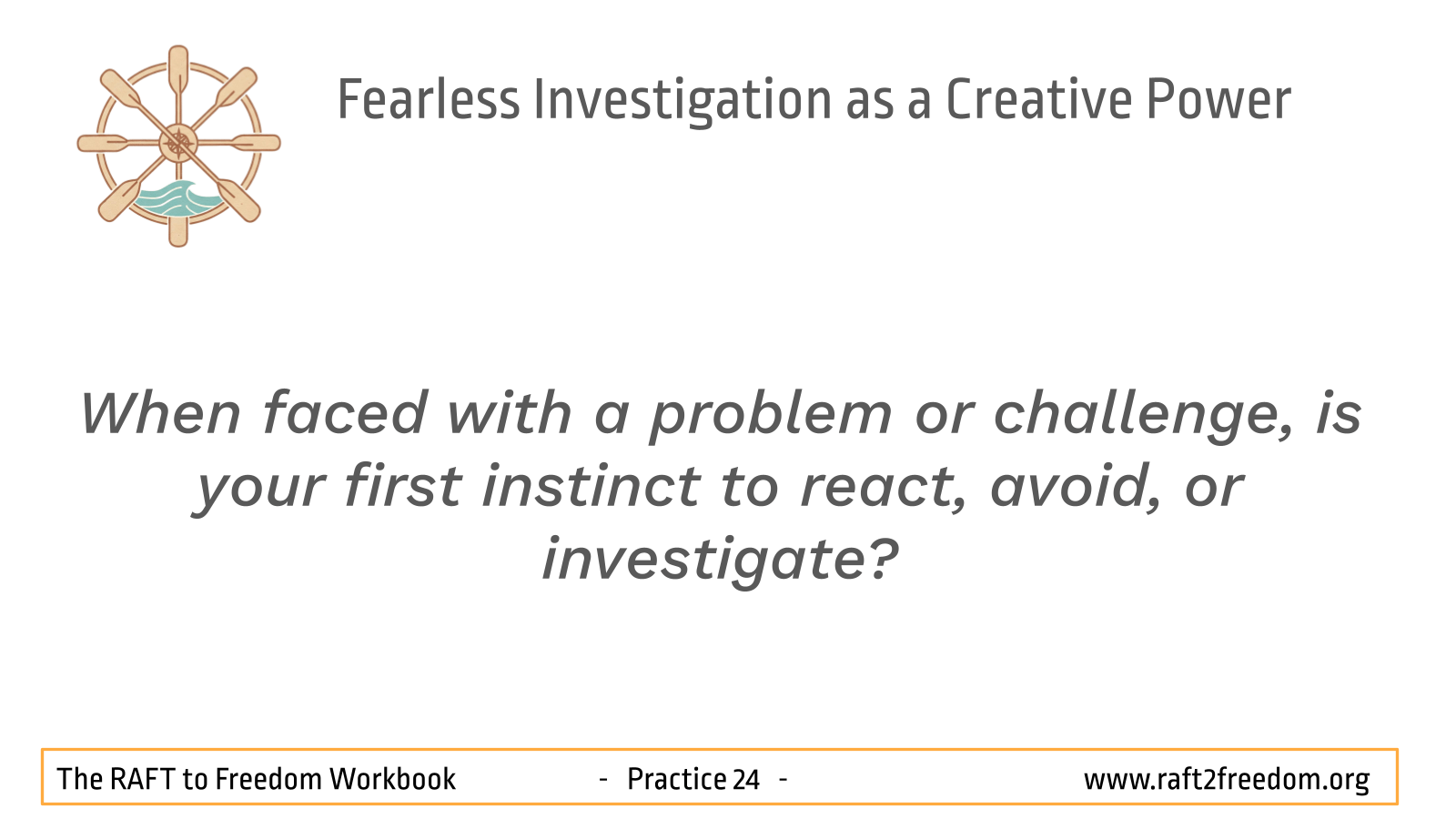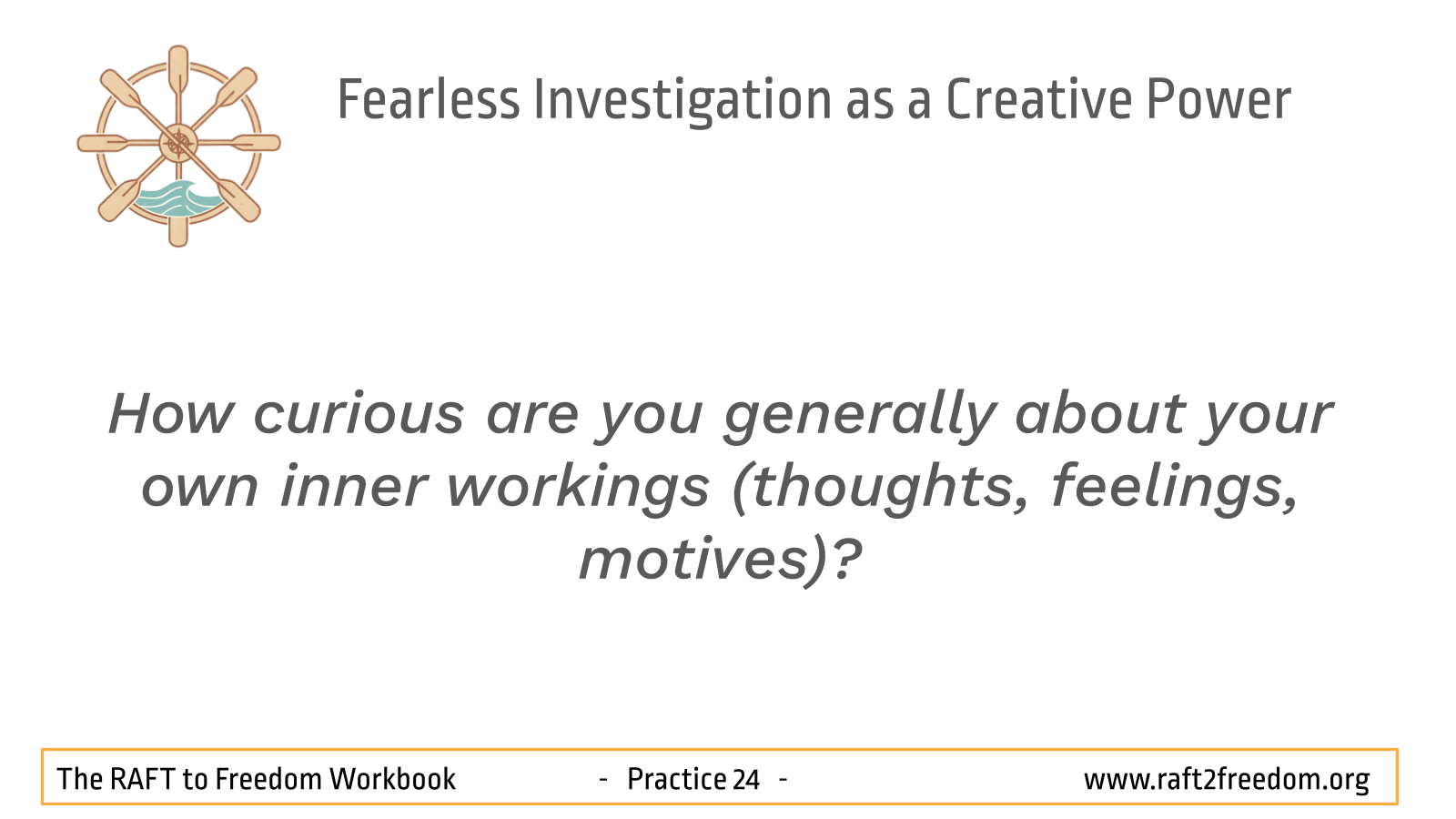24 – The Fourth Creative Power – Fearless Investigation as a Creative Power
The intelligent navigation system of our raft
The interactive power of watchful, wise inquiry
Do not go by reports, by legends, by traditions, by scripture, by logical conjecture… But when you know for yourselves that, ‘These things are skillful… these things, when undertaken and observed, lead to welfare and happiness’ – then you should enter and remain in them.
Gotoma (the Buddha)
Nothing ever goes away until it has taught us what we need to know.
Pema Chödrön
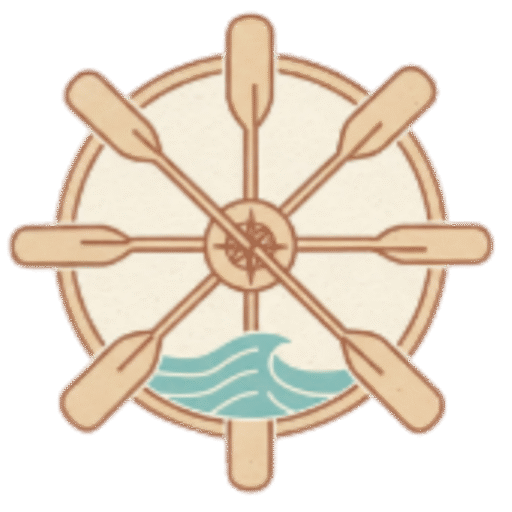
Episode 24 – Fearless Investigation as a Creative Power
An AI generated ‘deep dive’ into this aspect of the RAFT to Freedom
We arrive at the fourth and final Creative Power: ‘Fearless Investigation’ or Wise Inquiry. This essential quality integrates and guides the other three Creative Powers – Noble Desire provides the direction, Courageous Energy provides the power, the Heart’s Compass provides the focus and stability and Fearless Investigation adds the crucial element of wisdom, discernment, analysis, and our ability to learn from experience.
Fearless Investigation is the faculty that asks ‘Why?’ and ‘How?’ It investigates the nature of things, explores the cause and effect in our own lives, and helps us to discern between what is skillful and unskillful, what leads us towards suffering and what leads us towards freedom. It’s not just a passive observation, but an active, yet non-interfering, inquiry. It embodies caring curiosity, non-judgemental critical thinking, and the willingness to experiment and to adapt our approach based on the results we observe.
This Creative Power is fearless, not because it’s aggressive, but because it requires us to use courage to look honestly at reality, including the uncomfortable truths about ourselves and our patterns, without flinching or falling into denial. It helps us to move beyond our assumptions and beliefs to a direct experiential understanding of how things really are.
Within this first stage of our journey, Fearless Investigation is the very faculty that allows us to deeply recognise the patterns of our pain, difficulties and disappointments, the workings of our mind, the effectiveness of our efforts, and the nature of our desires. It is the engine of insight within the process of recognition.
In our RAFT to Freedom metaphor, Fearless Investigation functions as our intelligent diagnostic system and adaptive navigational computer. It constantly monitors our raft’s progress, analyses the effectiveness of our paddling techniques (Courageous Effort), checks the accuracy of the compass reading (Heart’s Compass), assesses the condition of the raft’s materials, learns from encounters with hazards or helpful currents. Along with Noble Desire, it refines our course based on this real-time data, and the location of our ultimate destination. It allows our raft’s navigation system to learn and adapt during our journey, ensuring we navigate skillfully towards the safe shore.
How to cultivate Fearless Investigation
Developing thisCreative Power involves nurturing our curiosity and our capacity to reflect:
- Cultivate genuine curiosity: Approach your experience, especially your challenges and habitual patterns, with a spirit of open inquiry rather than self-judgment or assumption. Ask ‘What is this?’, ‘How does this work?’, ‘What conditions allow this to arise or cease?’
- Mindfulness as our foundation: Clear seeing requires careful observation. When we cultivate a foundation of sustained mindfulness, this provides us with the raw data that Fearless Investigation needs to probe and analyse.
- Regular reflection: Set aside some time to consciously reflect on your experiences on your journey to freedom. ‘What happened during that craving?’ ‘What helped me get through that difficult emotion?’ ‘What patterns am I noticing?’
- Wise questioning: Learn to ask skillful questions that lead you towards a deeper understanding and insight, rather than questions that fuel your rumination or self-criticism. Focus on the causes, conditions, and consequences.
- Learning from experience (successes and setbacks): View all your experiences, including slips, lapses or difficulties, as valuable data. Instead of self-blame after a setback, ask yourself with kind curiosity: ‘What were the conditions that led to this? What can I learn to strengthen my prevention or abandoning skills next time?’
- Skillful experimentation: Be willing to try different strategies or mindfulness techniques (different adjustments to the raft’s sails or steering) and objectively observe their effects. Adapt your approach based on what proves to be genuinely helpful for you.
Fearless Investigation on our journey to freedom.
Fearless Investigation is the wisdom aspect that makes our journey to healing truly transformative:
- Understanding causes and conditions: Fearless Investigation helps us to move beyond simplistic explanations (‘I’m just weak’) to understand our complex web of internal and external conditions (triggers, stress, underlying needs, thought patterns) that contribute to our destructive behaviours. Journaling and tracking patterns are key tools here.
- Discerning skillful means: Cultivating well-being involves finding what actually works for us. Fearless Investigation allows us to objectively assess many different strategies (meditations, therapies, support groups, coping skills) and adapt our personal approach based on results, rather than us rigidly sticking to something ineffective.
- Seeing through delusion: Fearless Investigation challenges our distorted thinking, denial, and rationalisations that often accompany the storms of habit that cloud our hearts. It can be helpful for us to see the true nature of cravings (that they are impermanent and impersonal) and the actual consequences of destructive compulsive behaviours versus the rewards we fantasise about.
- Learning from a slip: Fearless Investigation transforms a set back from a catastrophe into a powerful learning opportunity. When we investigate the triggers and chain of events without harsh self-blame, we gain crucial information to strengthen future prevention.
- Developing insight into ‘Not-Self’: Ultimately, investigating the nature of craving, thoughts, feelings, and the body leads to the profound insight that there is no fixed, solid ‘self’ driving our cravings and compulsions – only impersonal, pre-conditioned processes. This insight dramatically weakens the power of identification of ‘I am this craving,’ ‘I am an addict’.
Self-reflections
Consider your natural inclination towards investigation:
- How curious are you generally about your own inner workings (thoughts, feelings, motives)?
- When faced with a problem or challenge, is your first instinct to react, avoid, or investigate?
- How do you typically respond when a strategy doesn’t work or you experience a setback? Do you tend to blame yourself, give up, or try to understand what happened?
- Are you open to questioning your own long-held beliefs or assumptions, especially those related to cravings and aversions?
- When do you feel most insightful or clear about your patterns? What conditions support that clarity?
Journaling prompts
Make some note about Fearless Investigation into your journal.
- Investigate a pattern: Choose one recurring compulsion, challenge or destructive pattern (for example, a specific trigger, a harmful habit, negative self-talk, or a difficulty with a particular practice). Write down investigative questions about it (for example, When does it arise? What precedes it? What follows it? What beliefs support it? What lessens it?). Explore possible answers.
- Learning from a setback: Reflect on a recent time things didn’t go as planned on your journey to wellness (a lapse, a strong craving you struggled with, a difficult interaction). Write about it from an investigator’s perspective: What were the contributing factors? What can be learned? What different strategy could be tried next time? Focus on the learning without self-blaming.
- Questioning assumptions: Identify one assumption or belief you hold about yourself, your patterns of self sabotage or your journey ahead. (for example, ‘I’ll always struggle with this,’ ‘I need this substance or behaviour to cope,’ ‘This feeling is unbearable’). Gently question this assumption. Is it 100% true? What evidence supports or contradicts it? What would it be like to hold this assumption more lightly?
- Tracking experiments: If you decide to try a new skillful means or wellness strategy (for example, a different meditation technique, a new way of responding to triggers), keep a brief journal tracking your experience and the observed results over a few days.
Supporting material: scientific and philosophical perspectives
For those interested in the scientific and philosophical underpinnings of Fearless Investigation, the following overview highlights some key connections. The power of investigation and insight is central to growth:
- Neuroscience: Fearless Investigation involves higher cognitive functions associated with the prefrontal cortex (PFC), including reasoning, analysis, problem-solving, cognitive flexibility, and metacognition (awareness of one’s own cognitive processes). Insight experiences (‘Aha!’ moments) may involve specific neural signatures, potentially involving areas like the anterior cingulate cortex and insula, integrating cognitive and emotional information. Mindfulness training has been shown to enhance functional connectivity related to insight and self-awareness. Learning from feedback involves reward prediction error signals (dopamine) and updating neural models.
- Psychology: Critical thinking skills are essential for Fearless Investigation. Reflective practice models are used in many professions to encourage learning from experience. Insight-oriented therapies aim to help clients understand the roots and patterns of their difficulties. Problem-solving therapy teaches systematic approaches to analyzing issues and finding solutions. Carol Dweck’s research on Growth Mindset emphasises the importance of seeing challenges as opportunities to learn and adapt (a core aspect of Fearless Investigation). Curiosity is increasingly recognised as a key factor in well-being and learning.
- Philosophy: Epistemology (the theory of knowledge) explores how we know what we know, emphasising critical inquiry and justification of beliefs. The Socratic method is a classic example of using questioning to uncover deeper understanding and challenge assumptions. The scientific method itself is a systematic process of investigation, hypothesis testing, and learning from results. Buddhist philosophy places wisdom, developed through investigation, as the ultimate liberating factor, cutting through ignorance. The principle of wise attention or appropriate reflection is central to developing insight.
Remember to remember
Fearless Investigation is the fourth essential Creative Power, bringing the light of wisdom and discerning intelligence to our journey to liberation. It integrates and guides the motivation of Noble Desire, the energy of Courageous Effort, and the focus of the Heart’s Compass. By cultivating curiosity, engaging in honest reflection, learning from all experiences, and wisely questioning our assumptions, we move beyond blind habit into conscious, adaptive, and insightful living.
Recognising our innate capacity for this wise inquiry completes our exploration of the Four Creative Powers within the first stage of our journey. Fearless Investigation is the crucial diagnostic and navigational intelligence of our raft, allowing us to understand the journey and refine our course.
We are now concluding the first stage of our journey – ‘Recognising what it is to be human. Understanding that life is often inherently painful, difficult and disappointing – this is natural and universal – not personal!
Grounded in ethical commitment, (the Five Gifts), a heart-based appropriate response, (self-compassion), embodied awareness, (Mindfulness of Body), skillful application of energy, (Four Intentions), and the potential of our inner powers, (Four Creative Powers), we have gathered a rich understanding of our current terrain and have collected materials and resources (skills and attitudes) for our raft.
We are now fully prepared to embark on the second stage of our journey – the ‘A’ of our RAFT acronym – ‘Abandoning’ harmful cravings and compulsions.
We do not learn from experience… we learn from reflecting on experience.
often attributed to John Dewey,
The important thing is not to stop questioning. Curiosity has its own reason for existing.
Albert Einstein
Sutta References
- Iddhipada-vibhanga Sutta (SN 51.20): Defines Fearless Investigation as the fourth base for spiritual power.
- Summary: Explains the base of power endowed with concentration founded on investigation (Fearless Investigation) and volition, indicating that focused inquiry and discernment are themselves a source of power for achieving goals.
- Fearless Investigationka Sutta (MN 47 – The Inquirer): Describes the process of investigating the qualities of a potential teacher (like the Buddha).
- Summary: While focused on investigating a teacher, this sutta exemplifies the method of careful observation, inquiry, and testing claims against experience, which is the essence of Fearless Investigation.
- Dhamma-vicaya Sambojjhaṅga (Factor of Enlightenment): Investigation of Dhammas (mental qualities/teachings) is a key factor for awakening (e.g., SN 46.53).
- Summary: Dhamma-vicaya, closely related to Fearless Investigation, involves wisely investigating the nature of mental and physical phenomena, discerning wholesome from unwholesome, and understanding core teachings like the Four Noble Truths or Dependent Origination. It is essential for developing wisdom.
- Kalama Sutta (AN 3.65): Encourages free inquiry and experiential verification over blind faith.
- Summary: Advises the Kalamas not to accept things solely based on authority or tradition but to investigate for themselves what leads to harm and what leads to benefit, embodying the spirit of Fearless Investigation.
- Paññā References: Suttas discussing wisdom (paññā) and discernment are highly relevant, as Fearless Investigation is the active investigative faculty that develops paññā. Right View (Sammā Diṭṭhi) is the result of successful investigation.
RAFT to Freedom © 2025 by Dr Cathryn Jacob and Vince Cullen is licensed under CC BY-NC-SA 4.0. To view a copy of this license, visit https://creativecommons.org/licenses/by-nc-sa/4.0/ |
